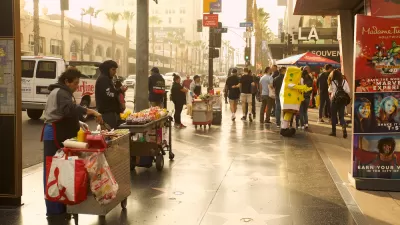The $500 million underground street vending economy in Los Angeles took a step closer toward legalization on Tuesday.
On Tuesday, the Los Angeles City Council Committee on Economic Development held a hearing on creating a framework for legalizing street vending. Street vending in Los Angeles is currently outlawed, and according to the organization backing the ordinance, the Los Angeles Street Vendor Campaign, "L.A. stands alone among the 10 biggest U.S. cities in totally outlawing the practice. The Bureau of Street Services hands out hundreds of citations to street vendors annually, each of which can result in fines of as much as $1,000 and jail time. Police arrested more than 1,200 street vendors last year, according to a city report."
As Emily Alpert Reyes reports for the Los Angeles Times, a fierce debate surrounds the issue of whether or not to legalize this underground economy. Street vending supporters "see legalization as an economic boon to the city and a lifeline to honest entrepreneurs, while critics worry about trash, congestion and a squeeze on bricks-and-mortar businesses."
Indeed, some opponents like the Studio City Neighborhood Council are concerned that "legalizing street vending will clog up and dirty sidewalks, jeopardize community health and safety, and create unfair competition for local businesses that face higher costs."
FULL STORY: L.A. officials take a step toward legalizing street vending

Planetizen Federal Action Tracker
A weekly monitor of how Trump’s orders and actions are impacting planners and planning in America.

San Francisco's School District Spent $105M To Build Affordable Housing for Teachers — And That's Just the Beginning
SFUSD joins a growing list of school districts using their land holdings to address housing affordability challenges faced by their own employees.

The Tiny, Adorable $7,000 Car Turning Japan Onto EVs
The single seat Mibot charges from a regular plug as quickly as an iPad, and is about half the price of an average EV.

Seattle's Plan for Adopting Driverless Cars
Equity, safety, accessibility and affordability are front of mind as the city prepares for robotaxis and other autonomous vehicles.

As Trump Phases Out FEMA, Is It Time to Flee the Floodplains?
With less federal funding available for disaster relief efforts, the need to relocate at-risk communities is more urgent than ever.

With Protected Lanes, 460% More People Commute by Bike
For those needing more ammo, more data proving what we already knew is here.
Urban Design for Planners 1: Software Tools
This six-course series explores essential urban design concepts using open source software and equips planners with the tools they need to participate fully in the urban design process.
Planning for Universal Design
Learn the tools for implementing Universal Design in planning regulations.
Smith Gee Studio
City of Charlotte
City of Camden Redevelopment Agency
City of Astoria
Transportation Research & Education Center (TREC) at Portland State University
US High Speed Rail Association
City of Camden Redevelopment Agency
Municipality of Princeton (NJ)





























